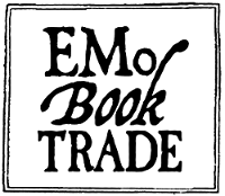The Project

The EMoBookTrade project is organized in five interrelated subprojects:
- Book prices in early modern Europe (c.1540-1630.). A database of prices will be created from the following sources:
- Book trade lists
- Italian and French publishers’ and booksellers’ printed catalogues
- A private library valued for sale by auction (1608)
- A publisher-bookseller’s archive (Christopher Plantin)
- Bookshop management and book prices in the early 17th century: the stock book of Bernardino Giunti
- Managing a transnational book sale network in the 16th century: the Gabiano papers
- The book privilege system in Venice (15th and 16th century)
- Book prices and the growth of cultural consumption
The Early Modern Book Prices database collects data from ten European locations from about 1540 to about 1630, classified and searchable by author, publisher, date and place of edition, format and subjects, plus other parameters, in order to compose customizable searches. The data are obtained from a variety of sources, but mainly from the catalogues of publishers or wholesale book sellers, thus allowing a fair representation of the market, unbiased by specific relationships between sellers and buyers.
Values refer to unbound books and are presented in the original currency of the sources; the equivalent in precious metal (silver) or in a single reference currency (Venetian lira) is also shown. Research can be conducted on total prices of a specific edition or price per sheet. Cross-search results can be exported in xml format and used for further analysis.
Research Questions
What factors influenced the setting of prices?
What were the average prices in different cities, in different periods?
What was the trend of prices over time?
The Early Modern Book Privileges in Venice database contains all book privileges granted from 1469 to 1603. A book privilege was a temporary monopoly granted to applicants by Venetian authorities to ensure that no competitor would publish, import or sell the same work in the domestic market. Penalties for offenders included the payment of a fine and the confiscation of the disputed stock. Applicants were mainly printers/publishers and authors. Book privileges are crucial sources for the analysis of the book market, both from economic and cultural points of view. Studies of book privileges enable investigation of the commercial dynamics in which printers and authors were involved during the Renaissance. Such studies also allow tracing of the editorial paths of literary and scientific works.
It’s out! Today is publication day for Gender and the Book Trades, from the conference of the same name in June 2021. Huge thanks to everyone who contributed and read drafts of this behemoth's xxii + 492 pages. We are so proud of it and hope you enjoy. https://brill.com/edcollbook/title/70509
First monograph about the greatest publisher in Italian!
New publication alert!🔔
@RenEmMil1 has published this seminal book on the mechanisms that regulated the functioning of the 16th-century #OfficinaPlantiniana of Christophe Plantin.
Available in Open Access here: https://www.francoangeli.it/Libro?id=29593
#bookhistory #twitterstorians
News
Antwerp Seminar of the EMoBookTrade Project, Auditorium of the Museum Plantin-Moretus, Antwerp, 26 August 2021
On 13 Nov 2020 at 2pm (CET) Angela Nuovo & Andrea Ottone will discuss Sacrobosco’s Sphere with Stefano Gulizia, Elio Nenci and Matteo Valleriani at the Milano Book City. Be sure to sign up here
International Conference Reshaping the Early Modern Book World: Competition, Protection, Consumption, University of Milan, postponed, date to be confirmed.
Angela Nuovo, Andrea Ottone, Erika Squassina, I privilegi librari nella prima età moderna fra tutela dell’editoria e disciplina dei contenuti, Pisa, Scuola Normale Superiore, 10 December 2019




